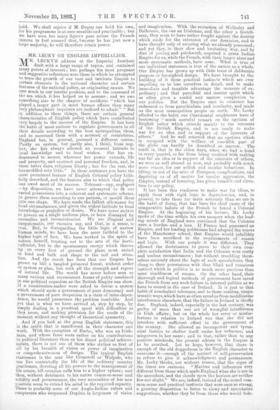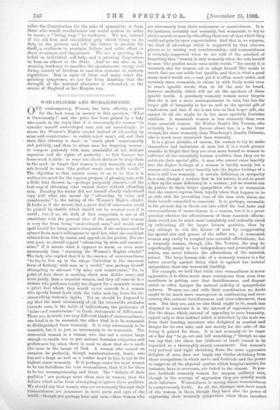MR. LECKY ON ENGLISH IMPERIALISM.
MR. LECKY'S address at the Imperial Institute dealt with a large range of topics, and contained many points of interest ; but perhaps his most pregnant and suggestive reflections were those in which he attempted to trace the growth of our vast and intricate Empire to certain elements in the national character and certain features of the national policy, as originating causes. We owe much to our insular position, and to the command of the sea which it has helped us to assume ; and we owe something also to the chapter of accidents "which has played a larger part in most human affairs than many very philosophical inquirers are inclined to admit." " But in addition to these things, there are certain general characteristics of English policy which have contributed very largely to the success of the Empire. It has been the habit of most nations to regulate governments in all their details according to the best metropolitan ideas, and to surround them with a network of restrictions. England has, in general, pursued a different course. Partly on system, but partly also, I think, from neg- lect, she has always allowed an unusual latitude to local knowledge and to local wishes. She has en- deavoured to secure, wherever her power extends, life and property, and contract and personal freedom, and, in these latter days, religious liberty ; but for the rest, she has meddled very little." In these sentences you have the most prominent feature of English Colonial policy faith- fully described, and the feature also to which that policy has owed most of its success. Tolerant—nay, negligent —by disposition, we have never attempted to fit our varied possessions into a coherent and systematic scheme, to govern them according to one pattern, or mould them Into one shape. We have made the fullest allowance for local circumstances, and given the widest latitude to local knowledge or prejudice or desire. We have never striven to govern on a single uniform plan, or been dismayed by anomalies and inconsistencies. We are illogical and unsystematic, our enemies say, and that, in a sense, is true. But, in disregarding the little logic of narrow human minds, we have been the more faithful to the higher logic of fact. We have worked in the spirit of nature herself, trusting not to the arts of the horti- culturist, but to the spontaneous energy which throws up on every foot of ground the plant most suited in kind and bulk and shape to the soil and situa- tion. And the result has been that our Empire has grown up like a tangled primeval forest, without order or system or plan, but with all the strength and vigour of natural life. The world has never before seen so many various and inconsistent forms of polity combined in one political organism as the British Empire can show. If a constitution-maker were asked to devise a system which should unite a government of pure democracy and a government of pure despotism in a state of inter-depen- dence, he would pronounce the problem insoluble. And yet that is what we have arrived at, step by step, by simply dealing in a practical spirit with difficulties as they arose, and making provision for the needs of the moment without any thought of theoretical symmetry.
And if you look at the great English statesmen, this is the spirit that is manifested in their character and work. With the exception of Burke, who was an Irish- man, and whose fame rests rather on his contributions to political literature than on his direct political achieve- ments, there is not one of them who strikes us first of all by his breadth of vision or power of imagination or comprehensiveness of design. The typical English statesman is the man like Cromwell or Walpole, who can live contentedly the life of the ordinary country gentleman, devoting all his powers to the management of his estate, till occasion calls him to a higher sphere ; and then, without detriment to his native common-sense and solidity and perseverance, the very necessities of his new position seem to extend his mind to the required capacity. There is probably none of our Anglo-Indian rulers and conquerors who surpassed Dupleix in largeness of vision and imagination. With the exception of Wellesley and Dalhousie, the one an Irishman, and the other a Scotch- man, they seem to have rather fought against the destiny which made for the extension of our dominion, and to have thought only of securing what we already possessed; and yet they, in their slow and hesitating way, and by dint of piecing and patchwork, acquired a great Indian Empire for us, while the French, with their larger aims and more systematic methods, have none. What is true of our individual statesmen is true of the nation as a whole. Our Empire has grown up with little trace of deliberate purpose or far-sighted design. We have brought to the building of it those practical instincts which are ever impelling us to lose ourselves in detail, and to make immediate and tangible advantage the measure of ex- pediency; and that parochial and insular spirit which so often gives a sordid and narrow complexion to our politics. But the Empire once in existence has redeemed us from parochialism and insularity, and made us the most cosmopolitan people on earth. Mr. Lecky alluded to the habit our Continental neighbours have of bestowing " much scornful remark on the egotism of English policy which attends mainly to the interests of the British Empire, and is not ready to make war for an idea and in support of the interests of others." And he well retorted that an egotism which is occupied with the welfare of one-fifth part of the globe can hardly be described as narrow. The truth is, that in the olden days, when we had a hand in every quarrel, so far from being credited with making war for an idea or in support of the interests of others, we were as well abused as now, and probably with much more reason, for our selfish and insular behaviour. In lifting us out of the mire of European complications, and depriving us of all motive for insular aggression, the Empire, instead of lowering, has given breadth and eleva- tion to our policy. It has been this readiness to make war for ideas, to apply them with rigid logic to dependencies, and, in general, to take them far •more seriously than we are in the habit of doing, that has been the chief cause of the comparative failure of the French to found a Colonial Empire. At the beginning of his lecture, Mr. Lecky spoke of the time within his own memory when the lead- ing minds of England were convinced that the Colonies were a burden and a loss. If France had possessed an Empire, and her leading politicians had adopted the tenets of the Manchester school, that Empire would infallibly have been sacrificed to the requirements of reason and logic. With our people it was different. They allowed the doctrinaires to prove to their own com- plete satisfaction that India and the Colonies were costly and useless encumbrances • but without troubling them- selves seriously about the logic of such speculations, they clung to their possessions with that blind and tenacious instinct which in politics is so much more precious than mere nimbleness of reason. On the other hand, their thorough and logical methods of government have saved the French from any such failure in internal politics as we have to record in the case of Ireland. It is just to that habit of nonchalant tolerance, and to those careless, unsys- tematic ways, which have so of ten saved us from meddlesome interference elsewhere, that the failure in Ireland is chiefly due. England, indeed, especially in the last century, was guilty of more than one act of wrongful interference in Irish affairs ; but on the whole her error or misfor- fortune in relation to Ireland was that she did not interfere with sufficient effect in the government of the country. She allowed an incompetent and tyran- nical faction to shelter itself under her influence, and misgovern in her name ; and to that, rather than to any positive misdeeds, the present schism in the Empire is to be ascribed. Let us hope, however, that there is enough of the old doggedness in the English character to overcome it—enough of the instinct of self-preservation to refuse to give it acknowledgment and permanence. Mr. Lecky thinks, not without reason, that the signs of the times are ominous. "Maxims and influences very different from those which made England what she is are in the ascendant, and the clouds upon the horizon are neither few nor slight." We see, indeed, instead of the sound com- mon-sense and practical instincts that were once so strong, a growing disposition to listen to viewy and speculative suggestions, whether they be from those who would fede- valise the Constitution for the sake of symmetry, or from those who would revolutionise our social system in order to secure a " living wage " to workmen. We see, instead of the old firm and unyielding grip which clung to its duty in the present and left the future to provide for itself, a readiness to proclaim failure and relax effort in sheer weariness and impatience. We see a growing dis- belief in individual self-help, and a growing disposition to lean on others or the State. And we see also an in- creasing tendency to sacrifice the spontaneous energy and living variety of freedom to cast-iron systems of uniform regulation. But in spite of these and many other dis- quieting symptoms, we are far from thinking that the strength of the national character is exhausted, or the course of England or her Empire run.







































 Previous page
Previous page